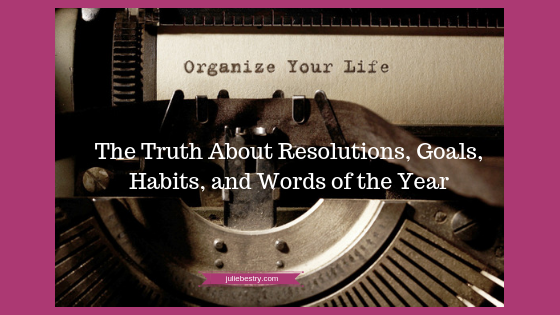Organize Your Life: The Truth About Resolutions, Goals, Habits, and Words of the Year

A new year begins and we give ourselves absolution for everything that has happened previously: our diets, our habits, our clutter. We have this vision that the true version of us isn’t reflected by everything we’ve ever been, but who we could become. Whether that mindset is more a matter of naiveté or positivity doesn’t matter as much as figuring out how we can transform this vision of who we want to be into a reality where we can say, this is who we truly are. So how do we get there?
RESOLUTIONS
New Year’s resolutions tend to come in two flavors. We promise ourselves we will change some behavior or personal trait (quit smoking, swear less, be nicer to our mothers, etc.) or accomplish some personal goal (run a 5K, learn Italian, knit a sweater). Making resolutions dates back ancient times. For example, the Babylonians apparently promised the gods they would return borrowed objects and repay debts. (Perhaps that resolution came from having achieved the prior year’s resolution to declutter, during which they found all the things they’d borrowed?)
In the United States, the ritual of making resolutions has actually increased over time, from about 25% of the population to over 40%. The biggest advantage I see in making resolutions is that it allows us to start the new year in a motivated, positive way – generally, at a time when the weather, our weights, our checking accounts, and our moods are fairly frightful. The disadvantage, however, is that most of us abandon our resolutions somewhere between February and June.
Resolutions tend to fizzle because of a few reasons: the real world (that is, the same things that kept us from maintaining our resolve last year) gets in the way, we haven’t identified working strategies for achieving our resolutions, or we have resolved to do something because we think we should rather than because we really want to do it.
If you’d like some inspiration for developing new or different resolutions, the Daring to Live Fully blog offers 29 New Year’s Resolution Ideas that go beyond the typical, with some motivational notions for volunteering, being more conscientious, and bringing more peace into your life. Lifehack has 50 New Year’s Resolution Ideas and How To Achieve Each of Them to help get you started. From adopting a pet to getting over an ex, there are enough choices to help you make this next year a little more interesting.
GOALS AND HABITS
Goals are the less shiny versions of resolutions. Nobody announces “New Year’s Goals” with a flourish or breathlessly asks celebrities about their “New Year’s Habits.” But goals provide a big-picture framework, and habits develop the muscles to accomplish those goals.
SMART goals are popular because they identify where resolutions and plans have might otherwise fail without precautions. SMART goals are supposed to be:
- Specific (What are you going to do? Use action verbs!)
- Measurable (What metrics will you use to show you’ve done what you said you’d do?)
- Achievable (Is this a practical goal? Is it realistic?)
- Relevant (Does this goal make sense for your life, family, or business?)
- Time-based (When will you start? When will you do the action? When will you repeat it? When will you finish? Remember, “Someday” is not a day on the calendar!)
You may want to lose weight, pay off debt, find a significant other, or grow your business, but the way to get there can’t be vague. Make sure your goals spell out what you’re going to do, how you’re going to do it, and how you’re going to measure your success.
Goals set the rules and create the game plan, but habits are how you get to the finish line. The reason you lose your keys all the time is because you don’t have a habit of always putting your keys in the same place every time you come home. (Or, I guess, you’ve got a hole in your pocket.)
Habits are settled or repeated tendencies. Bad habits become like second nature (which makes them hard to break). Luckily, good habits are hard to break, too! That means that if you can get in the habit, so to speak, repeating positive, healthy tasks, you stand a much better chance of achieving your goals.
Two superior resources for understanding how habits work, and how you can put them to use in your life, are:






So many fascinating resources – I can’t imagine how much time you spend researching! I’ve bookmarked several of these links to explore more fully later on.
Thank you so much, Janet. I do love to do the research, but sometimes I wonder if my mantra should be, “Stop saying SO much.” 😉
Wow, Julie! That’s a lot of great information and resources. Both of the books you mentioned (Duhigg’s and Clear’s) I’ve read and loved. Your descriptions were excellent.
Over the years, I’ve tried many of the “resolution” concepts that you described. However, this year I am trying something different (and not on your list.) I’m setting an intention in the form of a question. My intention question is, “What will I say ‘yes’ to this year? But the qualifying to the question is really what interesting opportunities or events will I say yes to without deliberation and doubt. Even though we’re only a few weeks into the New Year, I’ve had a chance to respond to this a few times now, and it’s been liberating.
What an intriguing approach, Linda! Indeed, I can’t wait to hear what you WILL say yes to in 2019! And thank you for the lovely words!